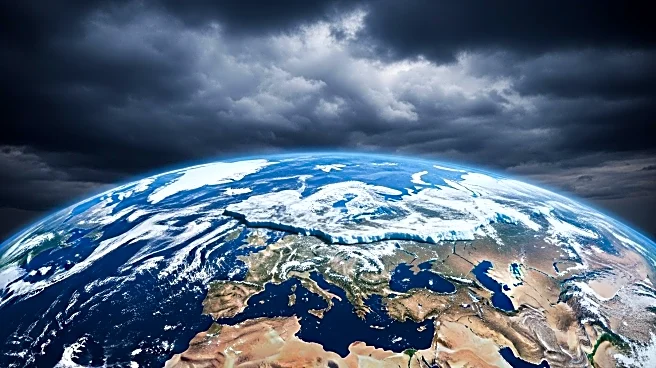What's Happening?
Recent scientific research has revealed that Earth's climate system might overcorrect for global warming, potentially leading to an ice age. Historically, the breakdown of silicate rocks has been considered a key factor in regulating Earth's climate. This process involves rain absorbing carbon dioxide (CO2) from the atmosphere, which then falls onto rock surfaces, dissolving minerals and carrying carbon into the oceans. Over time, these materials accumulate on the seafloor, effectively locking away carbon. However, the study indicates that extreme glaciations in Earth's history cannot be explained by rock weathering alone. Instead, the storage of carbon in the ocean floor and the role of nutrients like phosphorus in algae growth are significant factors. As atmospheric CO2 levels rise, more nutrients are carried into the oceans, fueling algae growth that captures carbon. When algae die, they sink to the seabed, burying carbon and cooling the Earth. This process, coupled with oxygen loss in oceans, creates a feedback loop that could lead to cooling overshoots, potentially triggering an ice age.
Why It's Important?
The findings of this study have significant implications for understanding Earth's climate dynamics and the potential long-term effects of current global warming trends. While the possibility of an ice age occurring due to overcorrection is not immediate, it highlights the complex interactions within Earth's climate system. The research underscores the importance of addressing ongoing warming, as the natural cooling processes are not fast enough to mitigate current climate change impacts. This study could influence future climate models and policies, emphasizing the need for proactive measures to limit CO2 emissions and manage nutrient cycles in oceans. Stakeholders in environmental policy, climate science, and global governance may need to consider these findings in their strategies to combat climate change.
What's Next?
The researchers plan to further refine their Earth System model to understand why the planet has sometimes recovered quickly from past climate perturbations. This involves exploring interactions with marine sediments and nutrient feedbacks. The study suggests that while the Earth will eventually cool, the timeline is uncertain, ranging from 50,000 to 200,000 years. This long-term perspective reinforces the urgency of current climate action. Future research may focus on how these processes can be integrated into climate policy and how they might affect predictions of future climate scenarios.
Beyond the Headlines
The study raises ethical and philosophical questions about humanity's role in altering Earth's climate and the responsibility to mitigate these changes. It also highlights the interconnectedness of geological processes and climate regulation, suggesting that human activities could have long-lasting impacts on Earth's natural systems. The potential for an ice age, while distant, serves as a reminder of the delicate balance within Earth's climate system and the need for sustainable practices.









